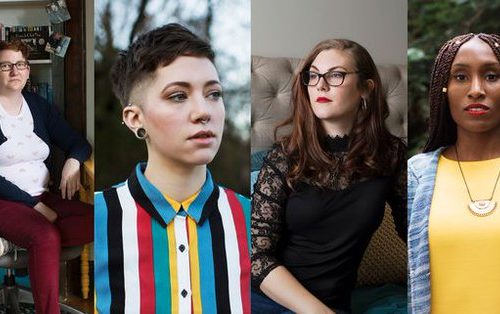Hello all!
It’s been a pretty good week, despite what happened Monday. I’ve been seeing a physical therapist/masseuse for back and neck problems I’ve had since my classical-piano-training days, and those sessions are finally becoming productive. Handsome had a four-day weekend. I cleaned out my office and found a ton of stuff to donate or sell. We had a barbeque with friends, then went to a free Big Band concert on the Potomac. Yesterday I did absolutely nothing, and today I’m experimenting with a new way of managing my oh-so-crazy hair (“Tousle me Softly” from Herbal Essences and “plopping“).
Speaking of, I wanted to apologize for something. Last Friday I talked about the struggle with my hair, but I chose to talk about it using the “natural hair” phrase. It was very innocently done– as a curly-haired woman, “going natural” has been something I’ve heard since I was a teenager. But then, all day Saturday I followed #NaturalHair on twitter, and listened to people like @thetrudz talk about how white women have co-opted “natural hair,” which hurts women of color, who struggle with their hair in ways I cannot fully understand. By describing my hair– which I inherited from my Jewish grandmother– as “natural,” I was participating in an online culture that has robbed women with Afro-textured hair of their words. Because now, even “going natural” is something white women do, and a white-woman’s naturally curly hair is now what “natural” means in many online circles. I regret that, and have committed to describing my hair as “naturally curly” if that distinction needs to be made.
~~~~~~~~~~
A few weeks ago, I received some criticism for my reaction to Stasi Elredge’s use of “accomplice” to describe abused mothers. A few people questioned how I thought women who “allowed” their children to be abused were not accomplices in some way. First, Stasi makes a distinction between abused women who are mothers and mothers who are also abusers– and she is talking about abused women when she uses the term “accomplice,” which is why my reaction was so visceral.
I don’t want to participate in erasing people who were abused by their mothers. Being an abuser isn’t limited to any gender. I also don’t want to dismiss the feelings of children who were abused by their fathers while their mother stayed with him. I can understand some of those feelings in a very small way. Many times, the relationship between my parents was unhealthy, and my father’s anger, fueled and encouraged by the biblical patriarchy he was being force-fed by a cult leader, caused him to do abusive things occasionally– things my mother disapproved of in private, but “stood with him in solidarity” about in front of me and my sister.
Experiencing that, watching that, is why I refuse to use the term “accomplice” to describe abused mothers. I refuse to assume that “why don’t you just leave him/her?!” is ever a good question to ask an abuse victim, regardless of whether or not the victim has children. All of the same dynamics that trap people in abusive relationships also exist when children are involved– sometimes those dynamics are exacerbated because of children. Leaving an abuser and getting full custody, or custody that requires supervised visits, can be an extremely bitter and violent process; I can understand why abuse victims might think that staying in an abusive situation is the best option. Throw in the conservative religious aspect that Stasi’s audience experiences, and you have a recipe for disaster.
I am extremely sympathetic with the feelings you might have if one parent was an abuser and the other refused to help you. Those feelings are legitimate. Your anger is justified. You have a right to feel betrayed by that.
However, I do not feel that using the term accomplice is ever appropriate to describe anyone who isn’t actively participating in violence. Forced compliance under threat of violence, abuse, attacks, excommunication, and other forms of religious and relational punishment does not make anyone an “accomplice.” It makes them a victim right alongside their children.
~~~~~~~~~
You have probably noticed that my posting has become slightly more sporadic as of late. I assumed that would happen when I started my YouTube channel (making each one feels a bit like writing a graduate-level conference paper), but I’ve also started shifting my focus from free-lance editing to free-lance writing. I have plenty of energy left over for writing when I’m editing someone else’s work, but writing my own work doesn’t leave me a lot left over for blogging.
However, I don’t want my blogging to be “sporadic,” so I’m going to start experimenting with different schedules. I’m going to try posting regularly on Monday-Wednesday-Friday and see how that works out for me. Thank you, everyone, for being a part of this journey. I’d never try doing something like becoming a writer if it weren’t for all of you.

